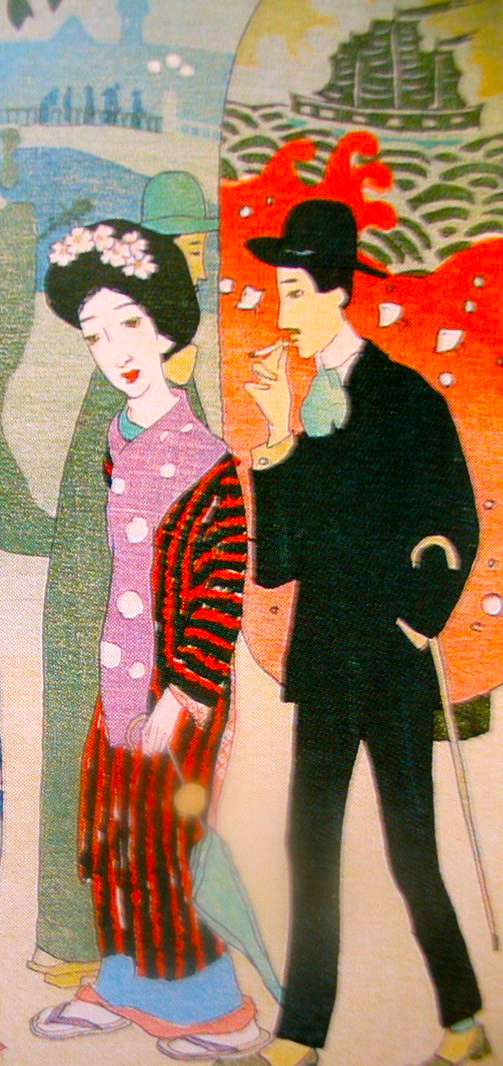My Wife
 Tuesday, April 3, 2012 at 1:02PM
Tuesday, April 3, 2012 at 1:02PM
 A month ago when I was doing some research into things men do that drive women up the wall, such as leaving the toilet seat up—it always bothers me when women forget to return it to its upright position—a Japanese woman told me she hated it when older Japanese men called their wives gusai (愚妻).
A month ago when I was doing some research into things men do that drive women up the wall, such as leaving the toilet seat up—it always bothers me when women forget to return it to its upright position—a Japanese woman told me she hated it when older Japanese men called their wives gusai (愚妻).
While I knew that Japanese men used to say that their wives were ugly (and their children, stupid) when talking to others, I had never actually heard this word used by anyone before. Gusai literally means “foolish wife”. Other self-deprecating terms for one’s wife include: keisai (荊妻) or “thorny wife”, which, just between you and me, is a suitable term for my own wife a day or two before her monthly “Girls’ Day” arrives; and, sansai (山妻), literally “mountain wife”, which implies that one’s wife grew up in the countryside and might not be the most refined of ladies.
There is no shortage of words for one’s wife in the Japanese language. Tsuma (妻) seems to be the most neutral, most common term. It’s the word what you’ll find in the dictionary defining all the other terms. It’s widely used in law and in the media. Men calling their own wives tsuma, however is a fairly new trend. In the Meiji Era (1868-1912), one’s wife was often called sai (妻).
Oku-san (奥さん) is a moderately respectful, yet informal way of referring to another person’s wife or when calling out to an older woman. The more polite form is oku-sama (奥様). Oku-sama was originally reserved for the legally recognized wife (正妻, seisai) of a daimyō (feudal lord) or kuge (court noble) but became popular among the samurai and merchant classes. Oku (奥) literally means "inner part" or "the back".
Kanai (家内), literally “inside the house”, is a somewhat polite term for wife and used when one is speaking to someone of an equal or higher position.
Both nyōbō (女房) and kami-san (上さん、lit. “Ms. Above”) are rather informal, and both are used by men when talking with co-workers or friends, namely, people they can feel at ease with. These words can also be used when talking about the wife of someone new to a group. Personally speaking, I’ve never cared much for the sound of nyōbō, which is too similar to the Japanese word for urine, nyō (尿). Kami-san has always had a cute-sounding ring to it.
Sai-kun (細君), which I have never heard myself, is a somewhat dated term used by men when talking about another person’s wife, particularly one who’s position is lower than their own. It can be used for talking about one’s own wife, but it’s not that common to use it in that matter anymore.
Kakā (嬶) is a slang term for talking about one’s wife that conveys a sense of being constantly scolded or pestered by the wife.
Yama no Kami (山の神, “God of the Mountain”) refers to a scary wife.
Finally, hitozuma (人妻), which means "another man’s wife", can carry the lewd connotation of wanting to cuckold a man by having a sexual relationship with his wife. Google 人妻 and you’ll be introduced to a whole new genre of Japanese pornography, lots of entertaining photos and cartoons of randy buxom women.
So, what do I call my wife? By her first name, of course.
You can find some interesting data on this here.
Another blogger has also written quite thoroughly on the topic here.
Reader Comments (3)
I heard once that 10% of Japanese husband's refer to their spouses as "waifu" (ワイフ=wife)
So have I.
It would be interesting to see the complete results of such a survey. I'm sure there's something out there. I'll dig around a bit online to see what I can find.
Thanks.
You can find some interesting data on this topic here.
http://whatjapanthinks.com/2010/01/13/how-japanese-call-their-partners/